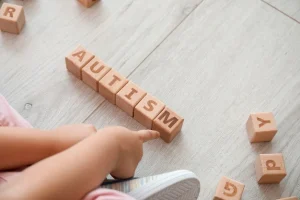How Anxiety Can Cause Stuttering
Last Updated: September 13, 2024
Have you ever found yourself stumbling over your words when you’re nervous? You’re not alone. Stuttering is a common speech disorder that affects millions of people worldwide. It involves disruptions in the flow of speech, such as repeating sounds, prolonging words, or experiencing blocks of silence. While stuttering can be frustrating, understanding its connection to anxiety can help you manage it better.
Did you know that anxiety can play a significant role in stuttering? When you’re anxious, your body and mind go into overdrive, which can make it harder to speak smoothly. This connection between anxiety and stuttering is something many people experience but might not fully understand.
Also read: What is Stuttering: Types, Symptoms, and Causes
Understanding Stuttering
Definition of Stuttering
Stuttering is a speech disorder that disrupts the normal flow of speech. It is characterized by repeated sounds, prolonged sounds, or blocks of silence where no sound is produced. These disruptions can make it difficult to speak fluently and can be frustrating for those who experience them.
Common Symptoms of Stuttering
If you or someone you know stutters, you might recognize these common symptoms:
- Repeating Sounds: This involves repeating parts of words, such as “b-b-b-book.”
- Prolonging Sounds: This occurs when a sound is stretched out, like “ssssssnake.”
- Blocks of Silence: Sometimes, a person might struggle to make any sound at all, which is known as a block.
Emphasizing Manageability
It’s important to understand that stuttering is a manageable condition. Many people who stutter lead successful, fulfilling lives. With the right strategies and support, you can learn to manage your stuttering and communicate effectively.
Also read: 12 Effective Stuttering Exercises for Adults at Home
The Impact of Anxiety on Stuttering
Anxiety can have a profound impact on speech, often exacerbating stuttering. When you’re anxious, several factors come into play that can make stuttering more pronounced.
1. Increased Tension
When you’re anxious, your body tends to tense up. This tension affects all your muscles, including those involved in speech. When your speech muscles are tense, it becomes harder to produce smooth, fluent speech. This muscle tension can lead to more frequent and severe stuttering episodes.
2. Racing Thoughts
Anxiety often brings a flurry of racing thoughts. When your mind is racing, it’s challenging to focus on what you want to say. This distraction can disrupt the normal flow of speech, causing you to stutter more. It’s like trying to speak while juggling multiple thoughts at once, which makes it difficult to concentrate on forming words clearly.
3. Fear of Speaking
One of the most significant impacts of anxiety on stuttering is the fear of speaking. Anxiety can create a fear of speaking in certain situations, especially when you anticipate stuttering. This fear can make you more self-conscious and nervous, leading to a vicious cycle where the more you fear stuttering, the more likely you are to stutter.
Physical and Mental Reactions Triggered by Anxiety
Anxiety triggers a range of physical and mental reactions that can affect your speech. Physically, you might experience symptoms like a racing heart, sweating, or trembling. These physical reactions can add to the difficulty of controlling your speech muscles. Mentally, anxiety can cause feelings of dread, worry, or embarrassment, all of which can disrupt your ability to speak smoothly.
Why Does Anxiety Make You Stutter?
Understanding why anxiety makes you stutter can help you manage it better. Let’s delve into the reasons behind anxiety-induced stuttering.
Physical Reactions
When you’re anxious, your body responds with a series of physical reactions. These include:
- Increased Heart Rate: Anxiety causes your heart to race, which can make you feel jittery and less in control of your speech.
- Muscle Tension: Anxiety tightens your muscles, including those used for speaking. This tension can make it difficult to articulate words smoothly, leading to more stuttering.
These physical reactions are part of your body’s “fight or flight” response, which prepares you to deal with a perceived threat. However, this response isn’t helpful when you need to speak clearly and calmly.
Mental Distractions
Anxiety can also create mental distractions that make it hard to focus on your speech. When you’re anxious, your mind may be filled with racing thoughts, such as worries about what others will think or fears of making mistakes. These thoughts can:
- Divert Your Attention: Instead of concentrating on what you want to say, you’re focused on your anxiety, which disrupts your speech.
- Increase Self-Consciousness: Being overly aware of your stuttering can make you more anxious, further affecting your ability to speak fluently.
Negative Feedback Loop
One of the most challenging aspects of anxiety-induced stuttering is the negative feedback loop it creates. Here’s how it works:
- Worrying About Stuttering: When you’re anxious about stuttering, you may become more self-conscious and nervous about speaking.
- Increased Stuttering: This anxiety can lead to more stuttering, which reinforces your fears and makes you even more anxious.
- Cycle Continues: This cycle of anxiety and stuttering can be hard to break, as each instance of stuttering increases your anxiety, leading to more stuttering.
Also read: Overcoming Stuttering: Impact of Anxiety and Stress on Stuttering
Can Anxiety Cause Stuttering in Adults?
While stuttering is often associated with childhood, it can also develop in adults, particularly due to high stress or anxiety. Understanding how this happens can help you manage it more effectively.
Stuttering in Adults Due to High Stress or Anxiety
For some adults, intense stress or anxiety can trigger stuttering, even if they didn’t stutter as children. This type of stuttering can emerge suddenly during periods of significant emotional distress, such as during a high-pressure job situation or a personal crisis. Anxiety-induced stuttering in adults can make everyday communication challenging and can impact various aspects of life, from social interactions to professional responsibilities.
Neurogenic Stuttering
Another form of stuttering that can develop in adults is neurogenic stuttering. This type is caused by brain injuries or neurological conditions. Unlike anxiety-induced stuttering, neurogenic stuttering is typically the result of physical changes in the brain. Common causes include:
- Brain Injuries: Trauma to the brain from accidents or injuries can disrupt the neural pathways responsible for speech.
- Neurological Conditions: Conditions such as stroke, Parkinson’s disease, or multiple sclerosis can affect the brain’s ability to coordinate speech, leading to stuttering.
Understanding the Difference
It’s essential to distinguish between stuttering caused by anxiety and neurogenic stuttering, as they require different approaches to management. While both types can significantly impact communication, the underlying causes and treatments differ.
- Anxiety-Induced Stuttering: Often managed through techniques that reduce anxiety and improve speech fluency, such as cognitive-behavioral therapy (CBT), relaxation exercises, and speech therapy.
- Neurogenic Stuttering: Typically addressed through medical treatment for the underlying neurological condition, alongside speech therapy to improve communication skills.
Recognizing the signs and seeking appropriate help is crucial. If you suspect that high stress or a neurological condition is affecting your speech, consulting with a professional can provide you with the right strategies and support.
Anxiety-Induced vs. Neurogenic Stuttering
| Feature | Anxiety-Induced Stuttering | Neurogenic Stuttering |
|---|---|---|
| Cause | High stress or anxiety. Anxiety-induced stuttering is primarily triggered by emotional and psychological factors, such as intense stress, anxiety, or traumatic events. | Brain injuries or neurological conditions. Neurogenic stuttering is caused by physical changes or damage to the brain, such as those resulting from strokes, head injuries, or degenerative neurological diseases. |
| Onset | Can develop suddenly in adulthood. This type of stuttering may start abruptly in response to a specific stressful event or period of high anxiety. | Often follows a stroke, head injury, etc. Neurogenic stuttering typically begins after an incident that affects the brain’s structure or function, leading to speech disruptions. |
| Treatment | CBT, relaxation techniques, speech therapy. Treatment focuses on reducing anxiety and improving speech fluency through cognitive behavioral therapy (CBT), relaxation exercises, and working with a speech-language pathologist. | Medical treatment for underlying condition, speech therapy. Addressing the root neurological issue is essential, and speech therapy can help improve communication skills. In some cases, medications may also be used to manage symptoms. |
| Physical Symptoms | Sweating, trembling, rapid heartbeat. Individuals may experience physical signs of anxiety, such as sweating, trembling, and a fast heartbeat, which can exacerbate stuttering. | May include other neurological symptoms. Along with stuttering, individuals may show signs of neurological impairment, such as difficulty with motor control, memory issues, or other cognitive deficits. |
Managing Anxiety-Induced Stuttering
If anxiety is making your stuttering worse, there are effective ways to manage it and improve your speech. Here are some practical tips that can help you reduce anxiety and stuttering.
Relaxation Techniques
Practicing relaxation techniques can help calm your mind and reduce muscle tension, making it easier to speak smoothly.
- Deep Breathing: Taking slow, deep breaths can help calm your nervous system. Try inhaling deeply through your nose for a count of four, holding your breath for a count of four, and exhaling slowly through your mouth for a count of four.
- Meditation: Regular meditation can help you manage stress and stay calm. Even a few minutes of mindfulness meditation each day can make a big difference.
- Progressive Muscle Relaxation: This involves tensing and then relaxing different muscle groups in your body. It helps release physical tension and promotes relaxation.
Speech Therapy
Working with a speech-language pathologist can provide you with personalized strategies to manage your stuttering and improve your speech fluency.
- Personalized Strategies: A speech therapist can teach you techniques such as controlled breathing, gentle onset of speech, and pacing your speech to reduce stuttering.
- Confidence Building: Regular sessions with a therapist can help you build confidence in your speaking abilities, reducing the fear and anxiety associated with stuttering.
Cognitive Behavioral Therapy (CBT)
CBT is a highly effective method for changing negative thought patterns that contribute to anxiety and stuttering.
- Changing Thought Patterns: CBT helps you identify and challenge negative thoughts that make you anxious about speaking. By changing these thoughts, you can reduce your anxiety and stuttering.
- Behavioral Strategies: CBT also includes techniques to manage anxiety in real-life situations, helping you stay calm and speak more fluently.
Read More: What is Cognitive Behavioral Therapy
Symptoms of Anxiety-Related Stuttering
Recognizing the symptoms of anxiety-related stuttering can help you understand when anxiety is affecting your speech. Here are some common signs to look out for:
1. Increased Stuttering During Stressful Situations
One of the most noticeable symptoms is a significant increase in stuttering during stressful or high-pressure situations. This might include speaking in public, during important meetings, or in social gatherings. When you’re anxious, your body’s stress response can make it more challenging to control your speech, leading to more frequent stuttering.
2. Physical Signs of Anxiety
Anxiety doesn’t just affect your speech; it can also cause physical symptoms that make stuttering worse. These physical signs include:
- Sweating: Excessive sweating, especially on the palms, can indicate that you’re feeling anxious.
- Trembling: Shaking hands or a trembling voice are common signs of anxiety that can interfere with your speech fluency.
- Rapid Heartbeat: A racing heart can make it difficult to focus on speaking clearly and calmly.
3. Avoidance of Speaking Situations
Another key symptom of anxiety-related stuttering is the tendency to avoid speaking situations altogether. This might mean:
- Avoiding Social Interactions: Skipping social events or gatherings where you might need to speak.
- Dreading Public Speaking: Feeling extreme fear or anxiety about speaking in front of others, leading to avoidance of presentations or meetings.
- Limited Communication: Speaking less frequently or keeping conversations short to avoid the possibility of stuttering.
Table of Symptoms
| Symptom | Description |
|---|---|
| Increased Stuttering | More frequent stuttering during stressful situations. This can happen when facing high-pressure scenarios such as public speaking, job interviews, or social interactions where there is fear of judgment or embarrassment. |
| Physical Signs of Anxiety | Anxiety often manifests physically, leading to symptoms like excessive sweating, trembling hands or voice, and a rapid heartbeat. These physical reactions can further disrupt speech and increase the likelihood of stuttering. |
| Avoidance of Speaking | Anxiety about stuttering can lead to avoiding speaking situations altogether. This includes skipping social events, avoiding conversations, or feeling dread at the thought of public speaking, which can significantly impact daily life and social interactions. |
When to Seek Help
Recognizing when to seek professional help for anxiety and stuttering is crucial for managing these conditions effectively. If anxiety significantly affects your speech, it might be time to reach out to experts who can provide tailored support and strategies.
When to Seek Professional Help
If you notice that anxiety is causing frequent or severe stuttering, or if it’s impacting your daily life and communication, seeking professional help can be beneficial. Here are some signs that it’s time to consult with a specialist:
- Persistent Stuttering: If stuttering persists and doesn’t improve with self-help techniques, professional intervention may be necessary.
- Increased Anxiety: When anxiety levels are high and difficult to manage on your own, it can worsen stuttering and overall well-being.
- Avoidance Behavior: If you find yourself avoiding speaking situations due to fear of stuttering, it’s a strong indicator that professional help is needed.
Role of Speech-Language Pathologists
Speech-language pathologists specialize in diagnosing and treating speech disorders, including stuttering. They can provide personalized therapy plans to help you manage stuttering effectively. Here’s how they can help:
- Assessment: An SLP will assess your stuttering patterns and the impact of anxiety on your speech.
- Therapy Techniques: They can teach you techniques to improve speech fluency, such as controlled breathing, pacing, and gentle onset of speech.
- Confidence Building: Working with an SLP can boost your confidence in speaking situations, reducing anxiety and improving communication.
Role of Mental Health Professionals
Mental health professionals, such as psychologists and therapists, can help address the underlying anxiety contributing to stuttering. They can offer:
- Cognitive Behavioral Therapy (CBT): CBT is effective in changing negative thought patterns and behaviors associated with anxiety.
- Stress Management: Techniques to manage stress and anxiety can reduce the severity of stuttering.
- Emotional Support: Mental health professionals provide a safe space to explore and address emotional factors related to stuttering.
Taking Action
If anxiety and stuttering are affecting your quality of life, don’t hesitate to seek help. Professional support can make a significant difference in managing these conditions and improving your overall well-being. Remember, you don’t have to face this challenge alone.
Conclusion
Understanding the relationship between anxiety and stuttering is important for managing both. Anxiety can make stuttering worse by causing increased tension, racing thoughts, and a fear of speaking. This creates a cycle where anxiety leads to more stuttering, which then increases anxiety. However, remember that you are not alone, and there are ways to manage anxiety-induced stuttering effectively.
At Wellness Hub, we offer resources and support to help you overcome these challenges. Whether you need speech therapy, tips for managing anxiety, or a supportive community, we are here for you. Visit Wellness Hub for more information and to find the help you need to speak confidently and reduce anxiety. Taking the first step towards seeking help can make a big difference in your journey to better speech and a more fulfilling life.
Frequently Asked Questions:
1: Can anxiety cause stuttering in adults?
Yes, anxiety can cause stuttering in adults. High levels of stress and anxiety can lead to speech disruptions, even in those who did not stutter as children.
2: How does anxiety affect stuttering?
Anxiety affects stuttering by increasing muscle tension, causing mental distractions, and creating a fear of speaking. These factors can worsen stuttering episodes.
3: What are the symptoms of anxiety-related stuttering?
Symptoms of anxiety-related stuttering include increased stuttering during stressful situations, physical signs of anxiety like sweating and trembling, and avoidance of speaking situations.
4: What is neurogenic stuttering?
Neurogenic stuttering is a type of stuttering caused by brain injuries or neurological conditions, such as strokes or head trauma. It is different from anxiety-induced stuttering.
5: How can I manage anxiety-induced stuttering?
Managing anxiety-induced stuttering can be achieved through relaxation techniques, speech therapy, and cognitive behavioral therapy (CBT). These methods help reduce anxiety and improve speech fluency.
6: When should I seek professional help for stuttering and anxiety?
You should seek professional help if stuttering persists, if anxiety levels are high, or if you are avoiding speaking situations. A speech-language pathologist or mental health professional can provide effective strategies and support.
7: What role do speech-language pathologists play in treating stuttering?
Speech-language pathologists assess stuttering patterns and provide personalized therapy to improve speech fluency. They teach techniques like controlled breathing and pacing to help manage stuttering.
8: Can cognitive behavioral therapy (CBT) help with stuttering?
Yes, cognitive behavioral therapy (CBT) can help by changing negative thought patterns and behaviors associated with anxiety and stuttering. It is an effective method for reducing anxiety and improving speech.
9: What relaxation techniques can help with anxiety-related stuttering?
Relaxation techniques such as deep breathing, meditation, and progressive muscle relaxation can help reduce anxiety and muscle tension, making it easier to speak smoothly.
10: Where can I find resources and support for managing stuttering and anxiety?
You can find resources and support for managing stuttering and anxiety at Wellness Hub. We offer speech therapy, anxiety management tips, and a supportive community to help you on your journey to better speech and reduced anxiety.
About the Author:
Anuradha Karanam
Speech-language pathologist (7+ years of experience)
Anuradha Karanam is a skilled speech-language pathologist with over 6 years of experience. Fluent in Tamil, Telugu, Hindi, and English, she specializes in parent counseling, speech sound disorders, fluency assessment, and speech-language evaluations. Anuradha excels at working with children with developmental disorders, offering creative and effective therapy programs. Currently, at Wellness Hub, she holds a BASLP degree and is registered with the RCI (CRR No A85500). Her patience, ambition, and dedication make her a trusted expert in her field.
Book your Free Consultation Today
Parent/Caregiver Info:
Client’s Details:
* Error Message









